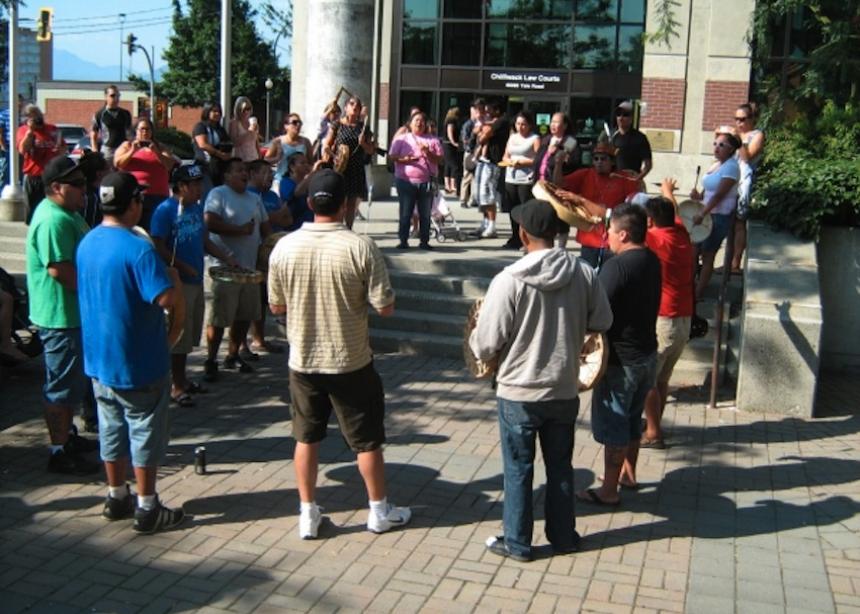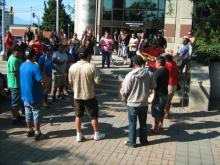In another of many court trials for Kwitsel Tatel, the aboriginal mother of two charged with illegal possession of fish, was jailed here July 25, along with her son, before the trial began. Kwitsel had shared her story at an Assembly 2012 workshop at the invitation of Professor Anthony Hall, an expert witness on her behalf, and Steve Heinrichs, director of Indigenous Relations for Mennonite Church Canada.
Clad in a ceremonial paddler’s dress, Hall reported to Canadian Mennonite, Tatel drummed and sang her evidence into the Chilliwack Court House. For this she was stopped on the stairs and assaulted by several large armed sheriffs. “After punching her son, Kwiis Hamilton, and after smashing apart the box of evidence I sought to deliver to Judge Crabtree’s court room, the sheriffs charged Tatel with what could best be described as ‘resisting assault.’ They jailed her and her son and pressed yet further scurrilous charges against.”
Tatel’s ceremonial drama was setting the stage in an ongoing eight-year series of trials fighting for her constitutional rights and was to symbolize the struggle by aboriginals through several generations of conflict with the federal government, says Hall. “The knowledge and practice of Aboriginal fishing runs primarily through Kwitsel Tatel’s maternal heritage. Her grandmother, Margaret Leon, was convicted and jailed in Burnaby’s Oakalla Prison for the supposed crimes of aboriginal dancing and singing which were outlawed by the Canadian Parliament from the late 1800s until 1951.
“As a girl Margaret had witnessed at the Hudson’s Bay Company post in Langley BC a ritual Roman Catholic burning of sacred masks. This anti-traditionalist ceremony was meant to remove cultural obstacles to the Christian dominance sought. This act of cultural extinguishment was part of a dark genocidal heritage in the Americas that began with the burning by Spanish priests of many sacred texts recording Aztec, Mayan and Inca heritages. The federally-funded Indian residential schools would continue this genocidal heritages including through concerted efforts to silence aboriginal languages.
“Oakalla Prison where Kwitsel Tatel’s maternal grandmother, Margaret Leon, was incarcerated for Aboriginal singing and dancing contrary to the Canadian Parliament’s notorious Indian Act.
“Christian missionaries had lobbied the Canadian Parliament to outlaw the West Coast potlatch and prairie sundancing because these Aboriginal spiritual traditions supported the legal functioning of sovereign Aboriginal societies. As long as potlatching and sundancing continued to thrive, strong Aboriginal nations on the resource frontiers of western North America remained more or less impervious to mass conversion to the religions and political economies of the newcomers.
“Like many Coast Salish people, of which her Sto:lo nationality forms but one part, Kwitsel Tatel has a Chinese ancestor, the father of her maternal grandmother Margaret Leon. The Chinese settlers in British Columbia tended to gravitate towards Indians because both groups were segregated in enclaves of exclusion outside the framework of Canadian citizenship. Registered Indians throughout Canada were not able to vote in Canadian, provincial and municipal elections until the 1960s.”
Hall sees the ongoing repressions of indigenous peoples throughout the Americas not as highlighted as the assaults on the human rights of aboriginal Palestinians. But he sees similarities in Canada. He calls it a “shared legacy.”
“The violent disentitlement, dispossession, and collective criminalization of indigenous Palestinians flow from the militarized expansion of the Israeli settler state. There is much that is similar in the fate heaped on the Indigenous peoples of North America over several centuries and on the aboriginal inhabitants of occupied Israel over recent decades,” he writes.
“Those of us in the so-called West who rightfully condemn the violent repression by the Israeli state need constantly to remind ourselves that the injustices directed at the Palestinians reenact older injustices interwoven into the living national fabrics of countries like the United States, Canada, New Zealand, and Australia. Where the South African government sought before the 1990s to replicate the constitutional mold of the so-called ‘White Dominions,’ under President Nelson Mandela this pivotal polity eschewed apartheid whose legacy and substance remains a factor in the organization of the political economies of Canada, Israel, Australia, the United States. Like the conquering founders of Protestant Ulster in northern Ireland, all these polities derived expansionary zeal from the religious mythology of the Judeo-Christian civilizing mission.”
--Aug. 17, 2012



Add new comment
Canadian Mennonite invites comments and encourages constructive discussion about our content. Actual full names (first and last) are required. Comments are moderated and may be edited. They will not appear online until approved and will be posted during business hours. Some comments may be reproduced in print.